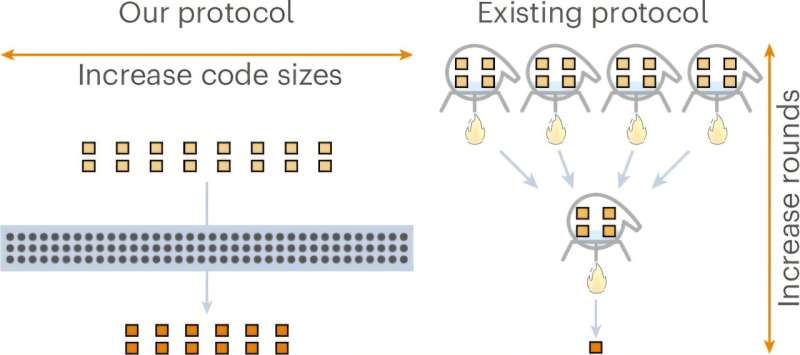Science
Researchers Achieve Breakthrough in Magic State Distillation

Researchers have achieved a significant milestone in quantum computing by demonstrating that the theoretically optimal scaling for magic state distillation is attainable for qubits. This advancement addresses a critical barrier in the development of fault-tolerant quantum systems, with the study published in Nature Physics marking a resolution to a longstanding challenge in the field.
Lead author Adam Wills, a Ph.D. student at the Massachusetts Institute of Technology’s Center for Theoretical Physics, emphasized the importance of this achievement. He noted, “Broadly, I think that building quantum computers is a wonderful and inspiring goal. However, it is an extremely challenging goal.” The fragility of qubits, which are susceptible to environmental interference, necessitates robust error-correcting codes to maintain their integrity.
While error correction is essential, it alone cannot solve the problem of executing non-Clifford operations crucial for achieving quantum advantage. Magic state distillation, introduced in 2005 by Bravyi and Kitaev, allows for these operations through the preparation of specialized quantum states. Despite its promise, the distillation process has historically been resource-intensive, with the overhead—the ratio of input to output states—growing as error rates decrease.
Achieving Constant Overhead
The efficiency of magic state distillation is measured by the overhead ratio, characterized by a scaling exponent termed γ (gamma). A lower γ indicates more efficient distillation, with a γ of zero signifying constant overhead, regardless of the required purity of the output states. In previous efforts, researchers have made progress toward reducing this scaling. For instance, Hastings and Haah reached γ of approximately 0.678 in 2017, while Krishna and Tillich approached γ = 0 in 2018, but only for increasingly large quantum systems.
Wills and his colleagues have established that achieving γ = 0 is possible, stating, “We demonstrate that constant-overhead magic state distillation is possible.” This finding suggests that a sufficiently large and accurate quantum computer could use their methods to distill magic states effectively.
Two-Stage Discovery Process
Wills explained that their groundbreaking result emerged from a two-stage discovery process. The first phase identified the potential of algebraic geometry codes, which offer strong error correction properties while working with fixed-size quantum systems. This innovation led to achieving constant overhead for 1024-dimensional qudits, a more complex quantum system compared to the two-level qubits typically used in practical applications.
The second stage involved insights gained from a textbook by Dan Gottesman. By exploring a lesser-known chapter, Wills and his team realized they could represent their qudits using multiple qubits. A 1024-dimensional qudit can be mathematically expressed as ten qubits, allowing the conversion of their constant-overhead protocol from qudits to the more practical qubit framework.
Future Directions and Significance
This breakthrough establishes a fundamental theoretical limit for magic state distillation, indicating that no better asymptotic scaling for overhead is possible. Yet, Wills pointed out the gap between theoretical advancements and practical implementation. While the γ = 0 scaling is theoretically optimal, actual resource requirements may necessitate significantly more physical qubits than are currently available in near-term quantum computers.
Despite these challenges, laying down solid theoretical foundations is crucial for advancing fault-tolerant quantum computing. Wills remarked, “Developing a solid theory of quantum magic is incredibly important for pushing fault-tolerance further in all regimes, because we know it is essential for universal quantum computation.”
The research team is exploring further extensions of their work, including Wills’s recent efforts on transversally addressable gates. Future investigations aim to optimize constant factors and explore variants of quantum low-density parity-check (LDPC) codes, as well as identify ideal conversions from qudits to qubits.
This research not only marks a significant step forward in the quest for effective quantum computing but also highlights the ongoing efforts necessary to bridge the gap between theory and practical application. The implications of this work could pave the way for more robust quantum systems capable of performing complex calculations beyond the reach of classical computers.
-

 Science4 weeks ago
Science4 weeks agoInterstellar Object 3I/ATLAS Emits Unique Metal Alloy, Says Scientist
-

 Science4 weeks ago
Science4 weeks agoResearchers Achieve Fastest Genome Sequencing in Under Four Hours
-

 Politics4 weeks ago
Politics4 weeks agoAfghan Refugee Detained by ICE After Asylum Hearing in New York
-

 Business4 weeks ago
Business4 weeks agoIconic Sand Dollar Social Club Listed for $3 Million in Folly Beach
-

 Health4 weeks ago
Health4 weeks agoPeptilogics Secures $78 Million to Combat Prosthetic Joint Infections
-

 Business4 weeks ago
Business4 weeks agoMcEwen Inc. Secures Tartan Lake Gold Mine Through Acquisition
-

 Lifestyle4 weeks ago
Lifestyle4 weeks agoJump for Good: San Clemente Pier Fundraiser Allows Legal Leaps
-

 Science4 weeks ago
Science4 weeks agoMars Observed: Detailed Imaging Reveals Dust Avalanche Dynamics
-

 Health4 weeks ago
Health4 weeks agoResearcher Uncovers Zika Virus Pathway to Placenta Using Nanotubes
-

 World4 weeks ago
World4 weeks agoUS Passport Ranks Drop Out of Top 10 for First Time Ever
-

 Entertainment4 weeks ago
Entertainment4 weeks agoJennifer Lopez Addresses A-Rod Split in Candid Interview
-

 Business4 weeks ago
Business4 weeks agoSan Jose High-Rise Faces Foreclosure Over $182.5 Million Loan









